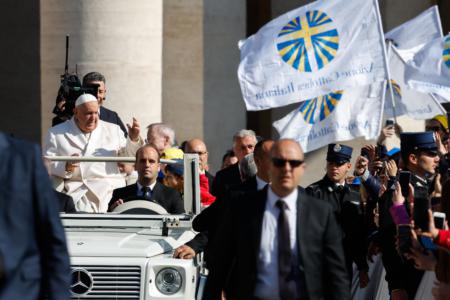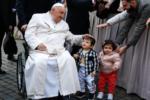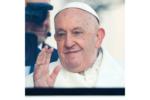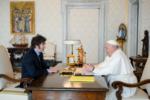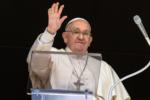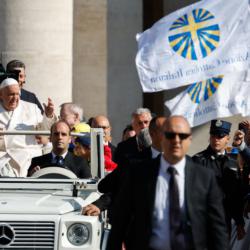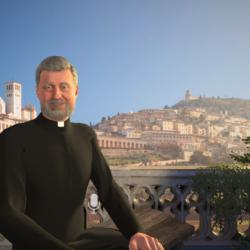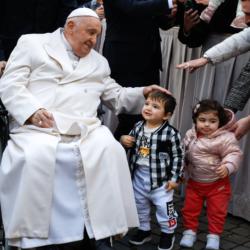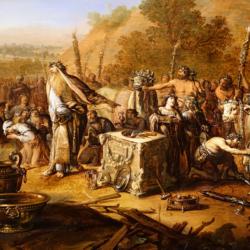Papal preacher: Trust Spirit's guidance in dealing with moral dilemmas
VATICAN CITY (CNS) -- The Catholic Church responds to new moral dilemmas not by applying age-old rules and standards, but by giving fresh responses in light of the Gospel, said the preacher of the papal household.
"The difficulty that is encountered on this path -- and which must be taken seriously -- is the fear of compromising the authority of the magisterium by admitting changes in its pronouncements," Capuchin Father Raniero Cantalamessa told Pope Francis and top Vatican officials.
Father Cantalamessa, preacher of the papal household, gave the second of his 2016 Advent reflections to the pope and his closest aides Dec. 9, focusing on understanding how the Holy Spirit works in the process of discernment.
The gift of discernment from the Holy Spirit, he said, allows assembled members of the church and individuals to distinguish "true doctrines from false one, orthodoxy from heresy" and God's will from personal desires.
One important point, "which may be helpful in the discussion taking place today on certain moral problems," he said, is reading the "signs of the times" in order to answer the questions people ask. Father Cantalamessa did not specify the moral dilemmas, although he was preaching at a time when some media were focused on differing opinions on proper ministry to divorced and civilly remarried Catholics.
"It is clear that if church has to discern the signs of the times in the light of the Gospel, it does not do so by applying long-standing measures and rules to the 'times,' that is, the problems and situations that emerge in society, but rather by giving new responses, 'intelligible to every generation' starting each time from the Gospel," he said.
The Holy Spirit guides the church either directly through revelations and prophetic inspirations, or "in a collegial way, through the painstaking and difficult confrontation, and even compromise, between the different parties and points of view."
Whenever members of the church have to gather to discern or make important decisions, they need "to have confidence in the ability of the Spirit to achieve that accord in the end, even if at times it can seem as if the whole process is getting out of hand," he said.
Every time Jesus acted, the Gospels tell us, he always confronted moral questions by condemning the sin and welcoming the sinner, the preacher said.
"He condemns adultery, even that of the heart, but he forgives the adulteress and gives hope back to her; he reaffirms the indissolubility of marriage, but he engages in conversation with the Samaritan woman" and even reveals to her what he had so far not told anyone so explicitly -- that he was the Messiah.
Sin is the work of the devil, not God, but the sinner is and will always be God's creature, made in his image and always possessing dignity, he said.
To understand how discernment in one's own life works, the papal preacher said, "through the gift, or charism, of counsel, the Holy Spirit helps us to evaluate situations and to orient our choices based not only on human wisdom and prudence but also in the light of the supernatural principles of faith."
The danger with personal discernment, he said, is forgetting the primary role of the Holy Spirit and putting too much emphasis on "psychological aspects."
"Discernment, in its essence, is not an art or a technique but a charism, a gift of the Spirit!" he said. "Its psychological aspects are of great importance, but they always come second."
Father Cantalamessa cited a number of ways the saints taught and guided their own process of discernment, like St. Ignatius of Loyola, who said an "experience of interior peace" was an essential aspect.
It entails presenting questions to God and waiting in prayer for his response as well as living with "a deep-seated habitual disposition to do God's will in every situation," he said.
Reading and contemplating sacred Scripture help the Holy Spirit shed his light in a person's soul, he said, diminishing the power of "the dark and hateful temptations that come from demons."
An examination of conscience, too, requires the same bold willingness to let God inside and "search our innermost being."
If it is not done or done superficially, the examination "easily becomes just a list of imperfections that we confess so that we can feel better without the attitude of real repentance," he said.
The papal preacher said he hoped his reflection would lead to "a renewed decision to entrust ourselves completely and for everything to the inner guidance of the Holy Spirit as a kind of 'spiritual direction.'"
